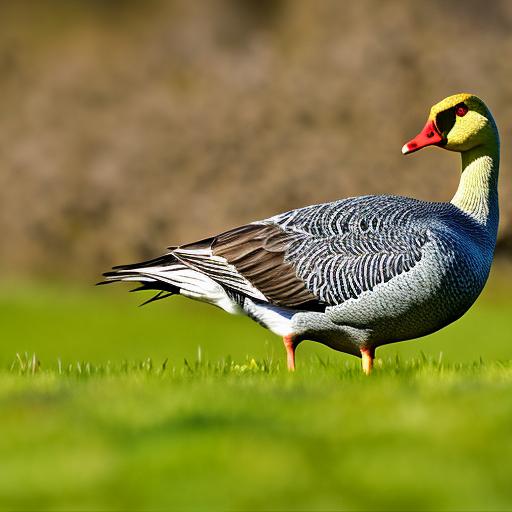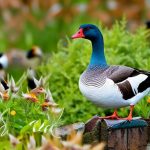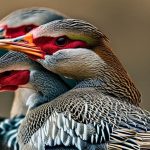Geese are a common sight in many areas, especially near bodies of water such as lakes, ponds, and rivers. They are known for their distinctive honking sound and their graceful flight patterns. However, while geese may be beautiful to look at, they can also cause significant damage to lawns. This article will explore the behavior of geese and the ways in which they can damage lawns.
Geese are social animals that typically live in large flocks. They are herbivores and feed on a variety of plant material, including grass. When geese graze on lawns, they can cause damage by pulling up grass roots, leaving behind bare patches of soil. Additionally, their droppings can be unsightly and can create an unpleasant odor. The combination of grazing and droppings can result in a lawn that is not only unattractive but also difficult to maintain.
Key Takeaways
- Geese can cause significant damage to lawns and landscapes.
- Understanding geese behavior can help in developing effective control strategies.
- Natural deterrents like planting certain types of vegetation can discourage geese from settling in an area.
- Physical barriers like fences and netting can prevent geese from accessing lawns and landscapes.
- Electronic repellents like sonic devices can be effective in keeping geese away from an area.
Understanding Geese Behavior
To effectively deter geese from lawns, it is important to understand their behavior and habits. Geese are attracted to lawns for several reasons. First, lawns provide a source of food in the form of grass and other vegetation. Second, lawns often border bodies of water, which are natural habitats for geese. Finally, lawns provide open spaces that allow geese to easily spot potential predators.
Geese are also known for their territorial behavior. They will defend their nesting sites and feeding areas from perceived threats, including humans and other animals. This territorial behavior can make it difficult to deter geese from lawns once they have established them as part of their territory.
Natural Deterrents for Geese
There are several natural deterrents that can be used to keep geese off lawns. One effective method is to plant certain types of vegetation that geese find unappealing. For example, geese are less likely to graze on lawns that are planted with tall grasses or native plants. These types of vegetation can create a physical barrier that makes it difficult for geese to access the grass.
Another natural deterrent is the use of certain scents or tastes that geese find unpleasant. For example, spraying a mixture of water and vinegar on the grass can deter geese from grazing. Additionally, planting certain types of herbs, such as mint or lavender, can create a scent that geese find unappealing.
Physical Barriers for Geese
In addition to natural deterrents, physical barriers can also be used to keep geese off lawns. Fences or netting can be installed around the perimeter of the lawn to prevent geese from accessing the grass. These barriers should be at least three feet high and should be securely anchored to the ground to prevent geese from flying over or crawling under them.
It is important to regularly inspect and maintain these barriers to ensure their effectiveness. Any holes or gaps in the fence or netting should be repaired promptly to prevent geese from finding a way through. Additionally, it may be necessary to periodically move the barriers to prevent geese from becoming accustomed to their presence.
Electronic Repellents for Geese
Electronic repellents can also be used to deter geese from lawns. These devices emit sounds or lights that are unpleasant to geese and can discourage them from approaching. For example, motion-activated sprinklers can be used to startle geese and deter them from landing on the lawn.
When using electronic repellents, it is important to follow the manufacturer’s instructions for installation and use. These devices should be placed strategically around the lawn to maximize their effectiveness. Additionally, it may be necessary to periodically change the location or settings of the repellents to prevent geese from becoming accustomed to them.
Scare Tactics for Geese

Scare tactics can be an effective way to keep geese away from lawns. One common scare tactic is the use of decoys, such as plastic owls or coyotes. These decoys can create the illusion of a predator and can deter geese from approaching. It is important to periodically move the decoys to prevent geese from realizing that they are not real.
Noise makers can also be used to scare geese away. For example, banging pots and pans together or using a whistle can startle geese and encourage them to leave the area. It is important to use these scare tactics consistently and in conjunction with other deterrents for maximum effectiveness.
Habitat Modification to Keep Geese Away
Modifying the habitat around a lawn can also deter geese from grazing. For example, planting shrubs or trees near the perimeter of the lawn can create a physical barrier that makes it difficult for geese to access the grass. Additionally, creating a buffer zone of tall grass or native plants between the lawn and the water can discourage geese from approaching.
It is important to regularly maintain these habitat modifications to ensure their effectiveness. Shrubs and trees should be pruned regularly to prevent them from becoming overgrown and providing cover for geese. Additionally, any dead or dying vegetation should be removed promptly to prevent geese from using it as nesting material.
Proper Lawn Maintenance to Deter Geese
Proper lawn maintenance can also play a role in deterring geese. Regular mowing can help keep grass short and less appealing to geese. Additionally, removing weeds and other unwanted vegetation can reduce the food source available to geese.
It is important to avoid overwatering lawns, as this can create an ideal habitat for geese by providing ample food and water sources. Instead, lawns should be watered deeply but infrequently to encourage deep root growth and discourage geese from grazing.
Legal Considerations for Geese Control
When it comes to controlling geese, it is important to be aware of and comply with any legal considerations. In some areas, geese may be protected by local or federal laws, and it may be illegal to harm or disturb them. It is important to research and understand the laws in your area before implementing any deterrent methods.
If legal methods are not effective in deterring geese, it may be necessary to seek professional assistance. There are companies that specialize in humane geese control and can provide guidance on the best methods for your specific situation.
Conclusion and Final Thoughts on Keeping Geese off Lawn
In conclusion, geese can cause significant damage to lawns through their grazing and droppings. However, there are several methods that can be used to deter geese and protect lawns. Natural deterrents, physical barriers, electronic repellents, scare tactics, habitat modification, and proper lawn maintenance can all play a role in keeping geese off lawns.
It is important to remember that no single method will be effective in all situations. It may be necessary to use a combination of deterrents and regularly rotate them to prevent geese from becoming accustomed to their presence. Additionally, it is important to stay within the bounds of the law when implementing geese control methods.
By understanding geese behavior and implementing effective deterrents, homeowners can protect their lawns from damage and maintain a beautiful outdoor space.
If you’re looking for effective ways to keep geese off your lawn, you may also be interested in learning about how to feed ducks properly. Poultry Wizard offers a comprehensive article on what you should feed ducks, providing valuable insights and tips to ensure their nutritional needs are met. Understanding the right diet for ducks can not only help attract them away from your lawn but also contribute to their overall health and well-being. To learn more about feeding ducks, check out the informative article at https://poultrywizard.com/keeping-ducks/what-should-you-feed-ducks/.
FAQs
What are some effective ways to keep geese off my lawn?
There are several effective ways to keep geese off your lawn, including using decoys, installing fencing, using repellents, and modifying the landscape.
What kind of decoys can I use to keep geese away?
You can use decoys such as fake predators, such as coyotes or owls, or even fake geese to deter real geese from landing on your lawn.
What kind of fencing is best for keeping geese off my lawn?
A fence that is at least 3-4 feet tall and has small mesh or wire spacing is best for keeping geese off your lawn. Electric fencing can also be effective.
What kind of repellents can I use to keep geese away?
There are several types of repellents that can be used to keep geese away, including sound repellents, visual repellents, and taste repellents.
How can I modify my landscape to keep geese off my lawn?
Modifying your landscape can include removing any standing water, reducing the amount of open grassy areas, and planting vegetation that geese do not like to eat.
Meet Walter, the feathered-friend fanatic of Florida! Nestled in the sunshine state, Walter struts through life with his feathered companions, clucking his way to happiness. With a coop that’s fancier than a five-star hotel, he’s the Don Juan of the chicken world. When he’s not teaching his hens to do the cha-cha, you’ll find him in a heated debate with his prized rooster, Sir Clucks-a-Lot. Walter’s poultry passion is no yolk; he’s the sunny-side-up guy you never knew you needed in your flock of friends!







